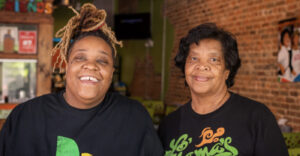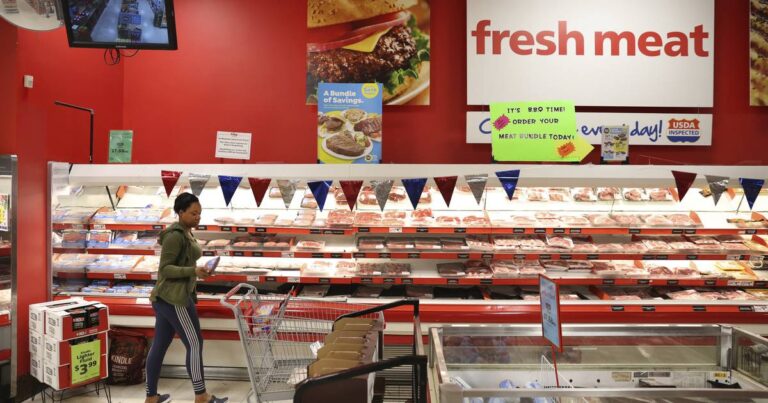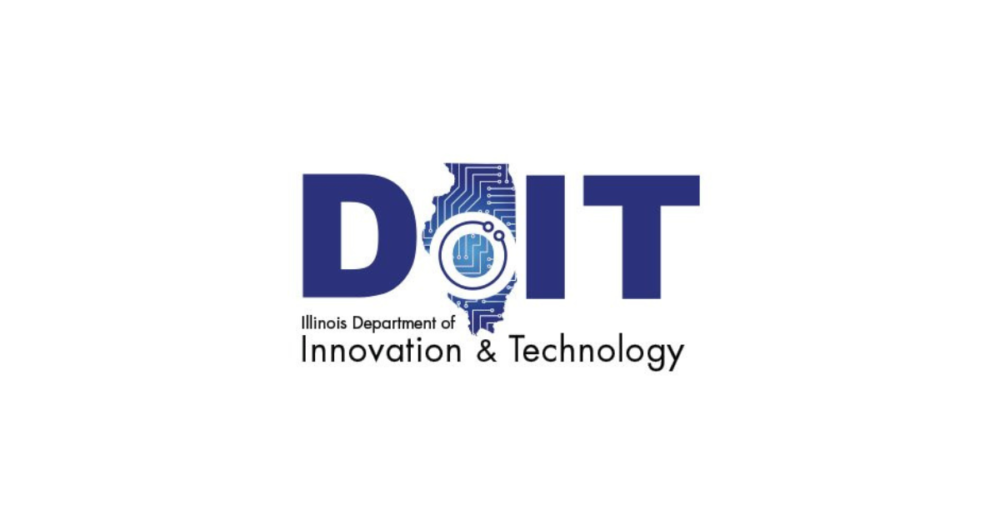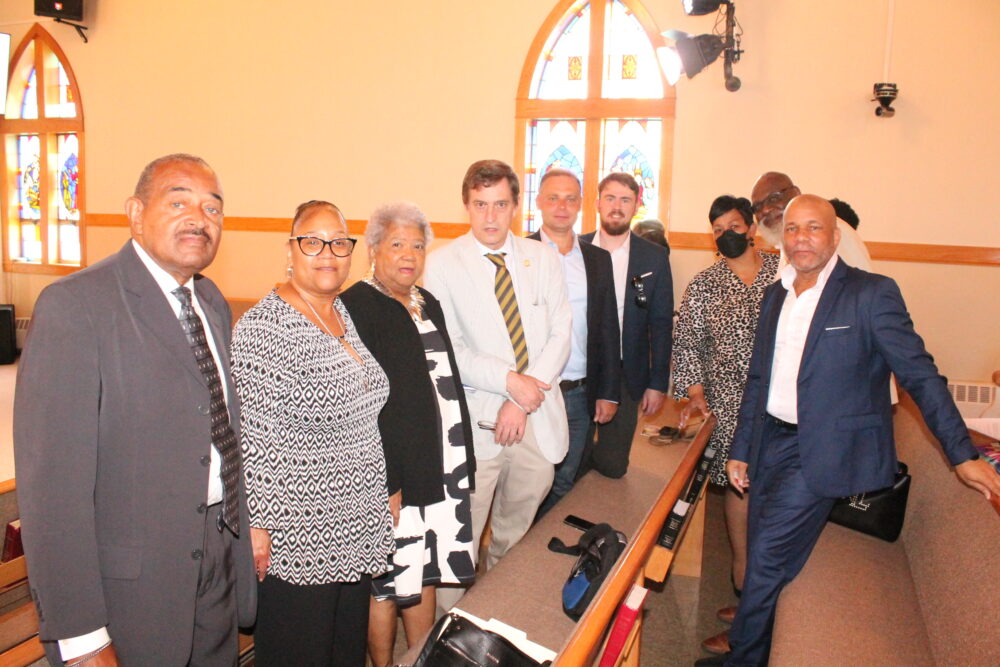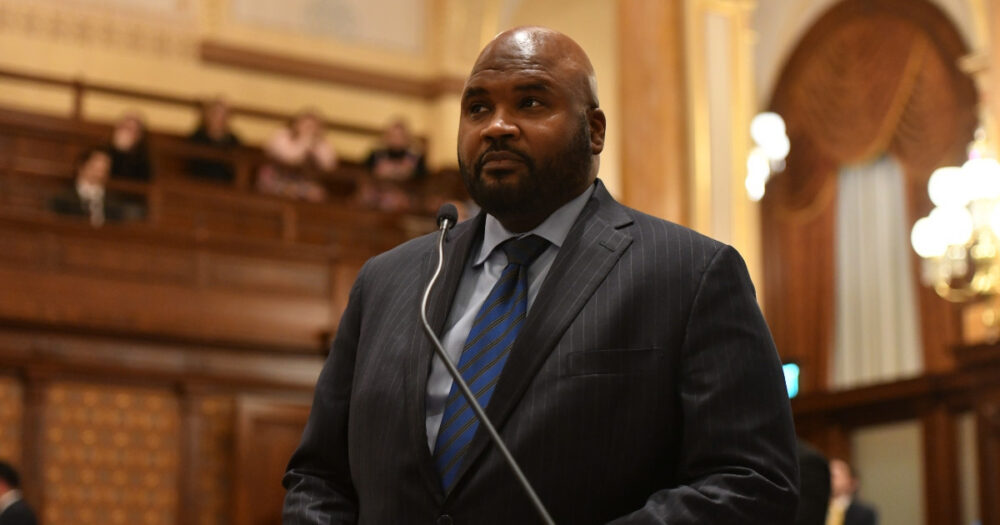A Save-A-Lot in Auburn Gresham that shuttered in 2020 may reopen by the end of the year.
The city announced Monday it would award a $13.5 million grant to Yellow Banana, a grocery company owned by the Cleveland-based investment firm 127 Wall Holdings LLC, to reopen the store and make investments in other Save-A-Lot locations. The money is part of more than $49 million in grant funding announced by the city Monday.
Advertisement
Yellow Banana plans to use the funds in combination with private money to reopen the Auburn Gresham store and acquire and renovate five other Save-A-Lots it operates on the city’s South and West sides. Though Yellow Banana has operated those stores under the Save-A-Lot name since late 2021, the buildings are owned by Save-A-Lot. The total cost of the project is estmated at $26 million.
The city funding comes as grocery companies continue to close stores on Chicago’s South and West Sides and as community leaders call on the city to provide solutions to lack of food access. In interviews, Yellow Banana executives said they’re committed to increasing food access in Chicago’s disinvested neighborhoods — and that they’re in the city to stay.
Advertisement
“We want to be the grocer of choice for communities and cities that are grappling with food insecurity,” Yellow Banana co-founder Michael Nance said in an interview with the Tribune. “We think we can be creative thought partners that can bring both private and public dollars to bear on the situation. We think we can provide solutions.”
Yellow Banana has operated six Save-A-Lot grocery stores on Chicago’s South and West sides since last year; nationally, it operates 38 Save-A-Lots across a handful of cities including Milwaukee and Cleveland.
Nance discussed plans for the Auburn Gresham Save-A-Lot at a neighborhood meeting in early July before the city announced its grant.
He pulled no punches when discussing Save-A-Lot’s reputation in Chicago, saying the company had “tarnished” its name in the city. Save-A-Lot’s physical conditions were not up to snuff, he said, and neither was the store’s produce.
In 2020, Save-A-Lot announced plans to sell off its corporate-owned retail stores and focus instead on wholesaling; the company now owns and operates only 18 out of more than 850 stores nationwide.
Advertisement
In a statement, Save-A-Lot CEO Leon Bergmann said Yellow Banana understands “the unique challenges these communities face, and are committed and determined to work with each neighborhood to serve them in the best way possible by providing healthy food at affordable prices, and giving them a refreshed and improved Save A Lot experience.”
Though 60% of the Yellow Banana-owned stores’ products will be sourced from Save-A-Lot, Yellow Banana has begun experimenting with other sources for products, Nance said. For instance, the company has switched its produce supplier to provide fresher produce. “Where appropriate,” he said, the company may offer organic produce. Yellow Banana is interested in stocking some locally-made products too, he said at the meeting this month.
Yellow Banana says that owning the stores’ real estate will help the stores stay in business; grocery is an industry with notoriously slim margins, which is especially true in the discount grocery sector, executives said.
Ademola Adewale-Sadik, a co-founder of Yellow Banana, said the company plans to put in new LED lighting, HVAC and refrigeration systems, as well as install new fixtures and bathrooms.
“We here in Auburn Gresham deserve a nice grocery store,” Adewale-Sadik said. “West Lawn, South Shore, South Chicago, West Garfield Park, we deserve nice things too.”
Nance said the renovations will require stores to close for about three to four weeks each. Yellow Banana plans to stagger the renovations and provide transportation to shuttle people to other grocery stores when their Save-A-Lot is closed, he said.
Advertisement
Nance said Yellow Banana hopes to open the Auburn Gresham store, located at 7908 S. Halsted, by the end of the year. The neighborhood lost another grocery store in June, when Aldi abruptly shuttered a store about a mile-and-a-half away from the closed Save-A-Lot. Other grocery stores nearby include a Walmart Neighborhood Market located north of the former Aldi on South Ashland and A Food 4 Less about a mile away.
The six stores Yellow Banana already operates in Chicago are located at 4439 W. 63rd St. in West Lawn, 420 S. Pulaski Road in West Garfield Park, 2858 E. 83rd St. in South Chicago, 10700 S. Halsted St. in Morgan Park, 7240 S. Stony Island Ave. in Grand Crossing and 644 E. 63rd St. in West Woodlawn. The West Woodlawn store is not included in the city grant funding.
Bergmann said Save-A-Lot’s shift to a wholesale model will benefit both its retail partners such as Yellow Banana and the communities they serve by tailoring the stores to local needs while saving money by using Save-A-Lot products.
Advertisement
The city’s South and West sides have struggled for years with grocery store closures and a lack of access to high-quality, affordable foods.
In April, Whole Foods announced it was closing the Englewood location it opened to much fanfare in 2016 with the help of $10.7 million in city funding. A closing date has not yet been announced for the store. The city’s sale agreement with the site developer requires a new grocery store to be up and running within 18 months once Whole Foods leaves.
When Aldi closed its Auburn Gresham store in June, South Side aldermen slammed the company and called for a city hearing on food access and grocery store closures.
Local elected officials in the neighborhood said they found out about the closure from constituents. Aldi cited declining sales and “repeated burglaries” in the closure of that store, saying in a statement that it did “not take the closing of this location lightly.” Within the last five years, there were seven burglaries on the store’s block, two of which took place at a grocery store, according to the city’s crime data portal.
Advertisement
The Auburn Gresham Aldi wasn’t the first grocery store the company closed in a historically disinvested neighborhood on the city’s South and West Sides; it shuttered a store in West Garfield Park last year.
Earlier this year, aldermen authorized the city to buy the West Garfield Park Aldi for $700,000. No replacement has been announced, but Department of Planning and Development deputy commissioner Peter Strazzabosco said the city expects to close on the property this summer. After the deal closes, a “community engagement process to help refine neighborhood objectives for a new grocery operator” would follow, Strazzabosco said. The city is in discussions with potential grocers for the location, he said.
Strazzabosco said more than half of the 79 Chicago Recovery Plan grant awards announced Monday will go toward new or improved grocery stores, restaurants and cafes. In total, the city is awarding more than $49 million during this round of grant funding, two-thirds of which comes from the city’s Chicago Recovery Plan local bond issue and one-third of which comes out of the city’s TIF and Neighborhood Opportunity Fund programs, Strazzabosco said. The Chicago Recovery Plan includes funding from the American Rescue Plan Act passed by Congress and more than $600 million in local bond funds.
Yellow Banana’s award of $13.5 million is the largest in this round of grants.
Advertisement
Yellow Banana executives acknowledged grocery companies’ histories of abandoning stores on the city’s South and West Sides and emphasized their commitment to Chicago’s communities as well as their own personal connections with food insecurity.
Nance said he grew up in a food desert on the east side of Cleveland. He now splits his time between Chicago and Cleveland.
“We, I think, respect these communities and people who have these backgrounds and quite frankly often look like us,” said Nance, who is Black and Puerto Rican.
“We are in this business for the long haul. There’s no sunset, there’s no end of fund life where we’ve got to monetize the stores and sell them off to the next owner, none of that,” said Adewale-Sadik. “We own these stores, we’re in the city, and we’re there to stay.”
Strazzabosco said that while operating terms of the city’s agreement with Yellow Banana were not yet finalized, the grant terms would include “operating, occupancy and other covenants at each location” that would be in place for at least a decade. City Council approval of the terms will be required, Strazzabosco said.
“It’s one solution, it’s not the solution,” said Ald. David Moore in an interview last week. Moore has backed Yellow Banana’s plans to reopen the Auburn Gresham Save-A-Lot in his 17th Ward. “Anytime we can bring economic development to the community, it’s good and it’s beneficial,” he said.


